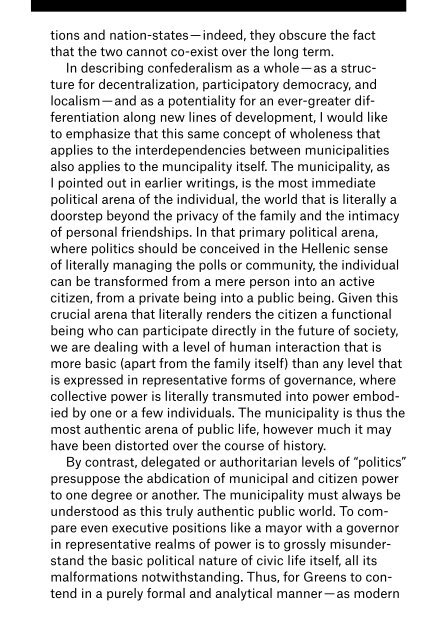Stateless Democracy
NWA5-Stateless-Democracy1.pdf?utm_content=buffer7beda&utm_medium=social&utm_source=twitter
NWA5-Stateless-Democracy1.pdf?utm_content=buffer7beda&utm_medium=social&utm_source=twitter
You also want an ePaper? Increase the reach of your titles
YUMPU automatically turns print PDFs into web optimized ePapers that Google loves.
tions and nation-states — indeed, they obscure the fact<br />
that the two cannot co-exist over the long term.<br />
In describing confederalism as a whole — as a structure<br />
for decentralization, participatory democracy, and<br />
localism — and as a potentiality for an ever-greater differentiation<br />
along new lines of development, I would like<br />
to emphasize that this same concept of wholeness that<br />
applies to the interdependencies between municipalities<br />
also applies to the muncipality itself. The municipality, as<br />
I pointed out in earlier writings, is the most immediate<br />
political arena of the individual, the world that is literally a<br />
doorstep beyond the privacy of the family and the intimacy<br />
of personal friendships. In that primary political arena,<br />
where politics should be conceived in the Hellenic sense<br />
of literally managing the polls or community, the individual<br />
can be transformed from a mere person into an active<br />
citizen, from a private being into a public being. Given this<br />
crucial arena that literally renders the citizen a functional<br />
being who can participate directly in the future of society,<br />
we are dealing with a level of human interaction that is<br />
more basic (apart from the family itself) than any level that<br />
is expressed in representative forms of governance, where<br />
collective power is literally transmuted into power embodied<br />
by one or a few individuals. The municipality is thus the<br />
most authentic arena of public life, however much it may<br />
have been distorted over the course of history.<br />
By contrast, delegated or authoritarian levels of “politics”<br />
presuppose the abdication of municipal and citizen power<br />
to one degree or another. The municipality must always be<br />
understood as this truly authentic public world. To compare<br />
even executive positions like a mayor with a governor<br />
in representative realms of power is to grossly misunderstand<br />
the basic political nature of civic life itself, all its<br />
malformations notwithstanding. Thus, for Greens to contend<br />
in a purely formal and analytical manner — as modern<br />
logic instructs that terms like “executive” make the two<br />
positions interchangeable is to totally remove the notion of<br />
executive power from its context, to reify it, to make it into<br />
a mere lifeless category because of the external trappings<br />
we attach to the word. If the city is to be seen as a whole,<br />
and its potentialities for creating a participatory democracy<br />
are to be fully recognized, so provincial governments and<br />
state governments in Canada and the United States must<br />
be seen as clearly established small republics organized<br />
entirely around representation at best and oligarchical rule<br />
at worst. They provide the channels of expression for the<br />
nation-state — and constitute obstacles to the development<br />
of a genuine public realm.<br />
To run a Green for a mayor on a libertarian municipalist<br />
program, in short, is qualitatively different from running<br />
a provincial or state governor on a presumably libertarian<br />
muncipalist program. It amounts to decontextualizing<br />
the institutions that exist in a municipality, in a province<br />
or state, and in the nation-state itself, thereby placing all<br />
three of these executive positions under a purely formal<br />
rubric. One might with equal imprecision say that because<br />
human beings and dinosaurs both have spinal cords,<br />
that they belong to the same species or even to the same<br />
genus. In each such case, an institution — be it a mayoral,<br />
councillor, or selectperson — must be seen in a municipal<br />
context as a whole, just as a president, prime minister,<br />
congressperson, or member of parliament, in turn, must<br />
be seen in the state context as a whole. From this standpoint,<br />
for Greens to run mayors is fundamentally different<br />
from running provincial and state offices. One can go into<br />
endless detailed reasons why the powers of a mayor are<br />
far more controlled and under closer public purview than<br />
those of state and provincial office-holders.<br />
At the risk of repetition, let me say that to ignore this<br />
fact is to simply abandon any sense of contextuality and<br />
126–127


